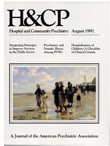A Supported Education Program for Young Adults With Long-Term Mental Illness
Abstract
Fifty-two young adults with severe psychiatric disabilities were selected to participate in a university-based supported education program aimed at helping them develop the skills to choose and implement a career plan. Thirty-five of the subjects completed the four-semester program. After the intervention, 42 percent of the students were competitively employed or enrolled in an educational program, compared with 19 percent before the intervention. The number of hospitalizations experienced by the subjects in the first year of the program decreased significantly, and the subjects' self-esteem increased significantly. The results indicate that rehabilitation services on a university campus may be a viable adjunct to more traditional rehabilitation services for persons with psychiatric disabilities.
Access content
To read the fulltext, please use one of the options below to sign in or purchase access.- Personal login
- Institutional Login
- Sign in via OpenAthens
- Register for access
-
Please login/register if you wish to pair your device and check access availability.
Not a subscriber?
PsychiatryOnline subscription options offer access to the DSM-5 library, books, journals, CME, and patient resources. This all-in-one virtual library provides psychiatrists and mental health professionals with key resources for diagnosis, treatment, research, and professional development.
Need more help? PsychiatryOnline Customer Service may be reached by emailing [email protected] or by calling 800-368-5777 (in the U.S.) or 703-907-7322 (outside the U.S.).



